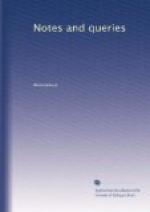In the course of this argument I have seen that if news were originally a plural noun, it might be taken for an ellipsis of new-tidings. My objection to this would be twofold. First, that the adjective new is of too common use, and, at the same time, too general and vague to form an ellipsis intelligible on its first application; and, secondly, that the ellipsis formed of new-tidings would be found to express no more than tidings, still requiring the new, if the idea of new were required, as in the instance Mr. Singer cites of new newes.
I would not pretend to determine whether the word were taken from the High German or the Dutch; but Mr. Singer’s remark, that our language has derived scarcely anything from the former, brings back the question to the point from which I originally started. That there was a political and commercial connexion between the two countries, I suppose there can be no doubt and such, I imagine, never existed without leaving its marks on languages so near akin.
Taking up Bailey’s Dictionary by accident a day or two ago, I turned to the word, which I there find as derived from Newes, Teut.; Bailey using the term Teutonic for German.
I think I shall express the feelings of the majority of your readers in saying that nothing could be more acceptable or valuable to the consideration of any etymological question than the remarks of Mr. Singer.
Samuel Hickson.
I have read with much interest the respective theories of the derivation of news, and it seems to me that Mr. Hickson’s opinion must give way to an excellent authority in questions of this kind, Dr. Latham, who says,
Some say, this news IS good in which case the word is singular. More rarely we find the expression, these news ARE good; in which case the word “news” is plural. In the word “news”, the -s (unlike the -s in alms and riches) is no part of the original singular, but the sign of the plural, like the -s in “trees.” Notwithstanding this, we cannot subtract the s, and say “new,” in the same way that we can form “tree” from “trees.” Hence the word “news” is, in respect to its original form, plural; in respect to its meaning, either singular or plural, most frequently the former.—Eng. Grammar, p. 62.
The above extract will probably suffice to show the true state of the case, and for information on similar points I would refer your readers to the work from which the above extract is taken, and also to that on The English Language, by the same author.
T. C.
* * * * *
REPLIES TO MINOR QUERIES.




